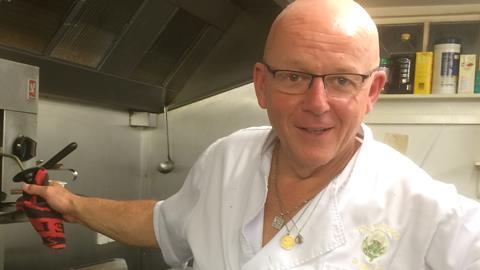Solicitor-advocate, Great Yarmouth
Before becoming a solicitor I worked in a number of sectors, including catering and heavy industry. However, ‘cheffing’ was attractive as its nomadic wild nature fitted in with my then feckless lifestyle. I returned to cheffing part-time a couple of years ago, partly in anticipation of the complete collapse of legal aid, but also because I missed the kitchen so much.
I was working as a griddle-chef in Guildford having been booted out of drama school. Many trainee solicitors worked in the restaurant part-time. One of them bewitched me. Interest in law followed soon after.
The old Solicitors’ Final Examination, coupled with articles, in my case within a respectable City firm, was preparation for anything legal this ghastly world could throw at me. So, quite how I ended up a criminal hack I do not know.
The current changes to legal aid are the hardest set of challenges I have faced as a lawyer. That, coupled with no increase in legal aid rates for 20 years, has meant that I now view criminal defence practice as a charitable vocation and have zero financial expectations. Hence my decision to start cheffing again.
In the world of criminal practice, it is often the ‘other contexts’ that are important. Whether defending or prosecuting, it is seldom solely a matter of evidence.
Working for the CPS and receiving a phone call from Reggie Kray come to mind as memorable career highlights. Obviously at different times, in case you are wondering.
Psychopaths are the hardest sort of client. It is difficult to maintain professional decorum with a client when he holds you in a firm headlock.
Without doubt, mystery has been lost in the changes I’ve seen in the profession. With the advent of Wikipedia and 24-hour reality television, everyone’s an expert. Especially in the world of criminal law. I have, on one occasion, found myself being lectured on the minutiae of custody time limits by the anxious girlfriend of a defendant.
The positive effect of the internet on legal practice cannot be overstated. The profession is also less fusty, more diverse and self-critical. These things are healthy for any profession, especially ours.
Has specialisation been a good thing for lawyers and clients? I think not. But, in reality, the glue that holds multi-departmental firms together is incredibly weak, especially at difficult times. So there is a natural tendency for firms to break up and for departments to move wholesale to specialise in their given areas, rather than stick together and slug it out.
I read somewhere that at the current rate of qualification one in 10 UK citizens will be solicitors within 40 years (other statistics are available). Given that startling statistic, we may as a professional body need to travel to seek clients with legal problems abroad. Or perhaps in outer space.































